7 books about Middle age
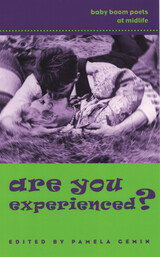
Are You Experienced? Baby Boom Poets At Midlife
Pamela Gemin
University of Iowa Press, 2003
In this timely and reflective anthology, the generation that sought to stay forever young reveals that midlife should mean more than jokes about thinning hair, creaking joints, and thickening waistlines. Midlife's insights—whether they be physical, spiritual, or emotional—are indeed startling, and who better than poets to deliver them?
[more]

Forty
The Age and the Symbol
Stanley Brandes
University of Tennessee Press, 1985
No description available.
[more]
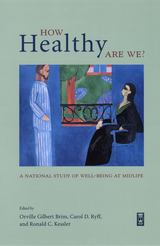
How Healthy Are We?
A National Study of Well-Being at Midlife
Edited by Orville Gilbert Brim, Carol D. Ryff, and Ronald C. Kessler
University of Chicago Press, 2003
Childhood, adolescence, even the "twilight years" have been extensively researched and documented. But the vast terrain known as midlife—the longest segment of the life course—has remained uncharted. How physically and psychologically healthy are Americans at midlife? And why do some experience greater well-being than others?
The MacArthur Foundation addressed these questions head-on by funding a landmark study known as "Midlife in the U.S.," or MIDUS. For the first time in a single study, researchers were able to integrate epidemiological, sociological, and psychological assessments, as well as innovative new measures to evaluate how work and family life influence each other.
How Healthy Are We? presents the key findings from the survey in three sections: physical health, quality of life and psychological well-being, and the contexts (family, work) of the midlife. The topics covered by almost forty scholars in a wide variety of fields are vast, including everything from how health and well-being vary with socioeconomic standing, gender, race, or region of the country to how middle-aged people differ from younger or older adults in their emotional experience and quality of life. This health—the study measures not only health-the absence of illness—but also reports on the presence of wellness in middle-aged Americans.
The culmination of a decade and a half of research by leading scholars, How Healthy Are We? will dramatically alter the way we think about health in middle age and the factors that influence it. Researchers, policymakers, and others concerned about the quality of midlife in contemporary America will welcome its insights.
* Having a good life means having good relationships with others to almost 70% of those surveyed. Less than 40% mentioned their careers.
* Reports of disruptive daily stressors vary by age, with young adults and those in midlife experiencing more than those in later adulthood.
* Men have higher assessments of their physical and mental health than woman until the age of 60.
The MacArthur Foundation addressed these questions head-on by funding a landmark study known as "Midlife in the U.S.," or MIDUS. For the first time in a single study, researchers were able to integrate epidemiological, sociological, and psychological assessments, as well as innovative new measures to evaluate how work and family life influence each other.
How Healthy Are We? presents the key findings from the survey in three sections: physical health, quality of life and psychological well-being, and the contexts (family, work) of the midlife. The topics covered by almost forty scholars in a wide variety of fields are vast, including everything from how health and well-being vary with socioeconomic standing, gender, race, or region of the country to how middle-aged people differ from younger or older adults in their emotional experience and quality of life. This health—the study measures not only health-the absence of illness—but also reports on the presence of wellness in middle-aged Americans.
The culmination of a decade and a half of research by leading scholars, How Healthy Are We? will dramatically alter the way we think about health in middle age and the factors that influence it. Researchers, policymakers, and others concerned about the quality of midlife in contemporary America will welcome its insights.
* Having a good life means having good relationships with others to almost 70% of those surveyed. Less than 40% mentioned their careers.
* Reports of disruptive daily stressors vary by age, with young adults and those in midlife experiencing more than those in later adulthood.
* Men have higher assessments of their physical and mental health than woman until the age of 60.
[more]
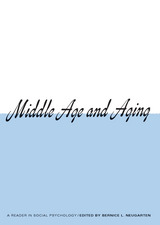
Middle Age and Aging
Edited by Bernice L. Neugarten
University of Chicago Press, 1968
The process of aging is receiving an increasing amount of attention from behavioral scientists. Middle Age and Aging is an attempt to organize and select from the proliferation of material available in this field. The selections in this volume emphasize some of the major topics that lie closest to the problem of what social and psychological adaptations are required as individuals move through the second half of their lives. Major attention is paid to the importance of age-status and age-sex roles; psychological changes in the life-cycle; social-psychological theories of aging; attitudes toward health; changing family roles; work, retirement, and leisure; certain other dimensions of the immediate social environment such as friendships, neighboring patterns, and living arrangements; differences in cultural settings; and perspectives of time and death.
[more]

Multiple Paths of Midlife Development
Edited by Margie E. Lachman and Jacquelyn Boone James
University of Chicago Press, 1997
In this collection, twenty-four leading researchers analyze the middle years of the lifespan, paying close attention to the many different facets of adult development. They study the various changes that middle-aged adults experience—from children moving in and out to going back to work and dealing with promotions, firing, and topping out. This work explains how these different experiences interrelate and how a better understanding of them can foster successful midlife development.
Much of the past work on midlife has been limited by its use of cross-sectional data, its focus on clinical populations, and the analysis of only one target group. Using a diverse set of longitudinal data, this volume provides a broader perspective by examining the similarities and differences in the midlife experience as a function of gender, social class, and birth cohort.
Of interest to scholars as well as to those interested in the midlife period for clinical or personal reasons, this volume informs us of the enormous potential and promise amid the gains and losses of the middle years.
Much of the past work on midlife has been limited by its use of cross-sectional data, its focus on clinical populations, and the analysis of only one target group. Using a diverse set of longitudinal data, this volume provides a broader perspective by examining the similarities and differences in the midlife experience as a function of gender, social class, and birth cohort.
Of interest to scholars as well as to those interested in the midlife period for clinical or personal reasons, this volume informs us of the enormous potential and promise amid the gains and losses of the middle years.
[more]
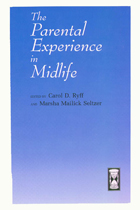
The Parental Experience in Midlife
Edited by Carol D. Ryff and Marsha Mailick Seltzer
University of Chicago Press, 1996
Most adults experience parenthood. But the longest period of the parental experience—when children grow into adolescence and young adulthood and parents themselves are not yet elderly—is the least understood. In this groundbreaking volume, distinguished scholars from anthropology, demography, economics, psychology, social work, and sociology explore the uncharted years of midlife parenthood. The authors employ a rich array of theory and methods to address how the parental experience affects the health, well-being, and development of individuals. Collectively, they look at the time when parents watch offspring grow into adulthood and begin to establish adult-to-adult relationships with their children.
With a strong emphasis on the diversity of midlife parenting, including sociodemographic variations and specific parent or child characteristics such as single parenting or raising a child with a disability, this volume presents for the first time the complex factors that influence the quality of the midlife parenting experience.
With a strong emphasis on the diversity of midlife parenting, including sociodemographic variations and specific parent or child characteristics such as single parenting or raising a child with a disability, this volume presents for the first time the complex factors that influence the quality of the midlife parenting experience.
[more]
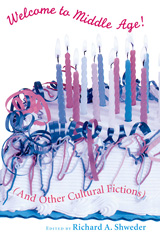
Welcome to Middle Age!
(And Other Cultural Fictions)
Edited by Richard A. Shweder
University of Chicago Press, 1998
Many of us believe we recognize the symptoms of middle age: lower back pain, mortgages, and an aversion to loud late-night activities. This particular construction of midlife, most often rendered in chronological, biological, and medical terms, has become an accepted reality to European-Americans and has recently spread to such non-Western capitals as Tokyo and New Delhi. Welcome to Middle Age! (And Other Cultural Fictions) explores the significance of this pervasive cultural representation alongside the alternative "fictions" that represent the life course in other regions of the world where middle age does not exist.
In this volume, anthropologists, behavioral scientists, and historians explore topics ranging from the Western ideology of "midlife decline" to cultural representations of mature adulthood that operate without the category of middle age. The result is a fascinating, panoramic collection that explores the myths surrounding and the representations of mature adulthood and of those years in the life span from thirty to seventy.
In this volume, anthropologists, behavioral scientists, and historians explore topics ranging from the Western ideology of "midlife decline" to cultural representations of mature adulthood that operate without the category of middle age. The result is a fascinating, panoramic collection that explores the myths surrounding and the representations of mature adulthood and of those years in the life span from thirty to seventy.
[more]
READERS
Browse our collection.
PUBLISHERS
See BiblioVault's publisher services.
STUDENT SERVICES
Files for college accessibility offices.
UChicago Accessibility Resources
home | accessibility | search | about | contact us
BiblioVault ® 2001 - 2024
The University of Chicago Press









